|
|
|
Sort Order |
|
|
|
Items / Page
|
|
|
|
|
|
|
| Srl | Item |
| 1 |
ID:
134846
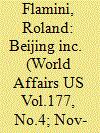

|
|
|
|
|
| Summary/Abstract |
This past Labor Day, a great many of the sausages consumed at cookouts across the country came from Smithfield Foods Inc., formerly the US food giant, but for the past year a wholly owned subsidiary of China’s Shuanghui International Holdings. Shuanghui paid $4.7 billion for Smithfield, whose operation spans hog farms and pork processing facilities in more than a dozen states, including Virginia, Maryland, North Carolina, and Wisconsin. The deal was China’s largest single investment in the United States to date, and helped boost Chinese mergers, acquisitions, and “greenfield projects” (companies setting up their own factories) to a record $14 billion by the end of 2013. Despite bilateral tensions over cyber espionage, Chinese territorial disputes with America’s allies in the South China Sea, and the slow progress of China’s massive economic reforms—and despite increasing calls for more scrutiny from Congress—China Inc closed a total of eight hundred and seventy-nine major deals last year across the American map, from New Jersey to California.
|
|
|
|
|
|
|
|
|
|
|
|
|
|
|
|
| 2 |
ID:
134700
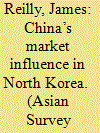

|
|
|
|
|
| Summary/Abstract |
North Korea’s deepening economic interactions with China have encouraged the former’s localized trends toward a more market-oriented and externally engaged society. This article compares China’s engagement strategy to South Korea’s “Sunshine Policy” and then assesses China’s transformational influence on North Korean institutions, cross-border cooperation, businesspeople, and consumers.
|
|
|
|
|
|
|
|
|
|
|
|
|
|
|
|
| 3 |
ID:
136771


|
|
|
|
|
| Summary/Abstract |
Many developing countries are going through a stretch of market reforms and liberalization in their economic relations with the rest of the world, and yet few of them have advanced anywhere near China in this field. The reasons are very likely in the way they are reforming their economies and in how far they are going in giving consideration to the local and outside environments.
|
|
|
|
|
|
|
|
|
|
|
|
|
|
|
|
| 4 |
ID:
134853


|
|
|
|
|
| Summary/Abstract |
This paper investigates the extent to which idiosyncratic shocks to the permanent income of various provinces in China were mitigated through the channel of provincial risk-sharing during 1952–2008. Taking into account the possibility of self-insurance through saving, we find that provinces in China shared roughly 38% of their idiosyncratic output shocks during the entire sample period. In particular, we show that conventional risk-sharing analysis in the extant literature that does not take into account the self-insurance channel tends to over-estimate the degree of risk sharing by implying a degree of risk sharing of around 54%. Moreover, in view of the major economic reforms that had taken place in the last few decades, we decompose the sample period into two sub-phases: the pre-reform period (1952–1978), the reform period (1978–2008). We find that there is a notable increase in the degree of provincial risk sharing in the reform period. The degree of provincial risk sharing across China is comparable to that across the OECD countries, but falls short of that among the states in the US.
|
|
|
|
|
|
|
|
|
|
|
|
|
|
|
|
| 5 |
ID:
134451


|
|
|
|
|
| Summary/Abstract |
Structural adjustment programs of the International Monetary Fund (IMF) are often blamed for disrupting social relations by forcing austerity on vulnerable people and introducing unpopular liberalization policies. Some suggest that such interventions harm ethnic relations in developing countries because they are insensitive to the tenuous social bargains that often preserve ethnic peace. Moreover, during crises, dominant groups may seek to displace the pain of reform on others, the ethnic division of labour may be affected differentially by reform policies, and ethnic entrepreneurs could use moments of crisis to their advantage. We test the propositions by using unique data measuring the level of ethnic tensions in a country. The results show that IMF interventions reduce conditions of ethnic enmity. These results are robust to fixed effects estimation, endogeneity and selection effects. Moreover, IMF interventions lower ethnic tension in countries that are highly fractionalized, but they are more problematic where larger groups face each other and when larger groups are excluded from state power. These results suggest too that IMF interventions may lead to greater empowerment of excluded groups who might agitate for change during periods of economic crisis. On balance, IMF interventions, relative to continued economic woe, pacify ethnic relations in crisis-ridden countries. We find no evidence to suggest that IMF programs increase ethnic tensions, which is good news for poor countries requiring cheap loans and assistance with reforms.
|
|
|
|
|
|
|
|
|
|
|
|
|
|
|
|
| 6 |
ID:
136566


|
|
|
|
|
| Summary/Abstract |
“Perhaps Maduro’s biggest deficit is his personal lack of charisma in a government designed by, institutionalized around, and requiring a charismatic figure.”
|
|
|
|
|
|
|
|
|
|
|
|
|
|
|
|
| 7 |
ID:
135155


|
|
|
|
|
| Summary/Abstract |
Countries afflicted by claims of territorial sovereignty within nation states have been predominantly preoccupied with sharing of administrative and political powers, as in the case of the armed conflict in Sri Lanka. This article argues that fiscal devolution has the potential to empower the regions within contested nation states and thereby contribute to conflict resolution in countries afflicted by internal strife and armed conflict, taking Sri Lanka as a case in point.
|
|
|
|
|
|
|
|
|
|
|
|
|
|
|
|
| 8 |
ID:
136677


|
|
|
|
|
| Summary/Abstract |
There is an increasing trend in developing countries to reform their higher education sectors towards internationalisation. The Government of India's policy stand on foreign direct investment in higher education so far suggests it considers this a useful strategy in addressing the qualitative and quantitative deficiencies of the sector. Advocates argue that the introduction of an element of competition through the entry of foreign providers would result in greater efficiency and quality in the overall educational service provision. This paper however supported by theoretical, empirical and policy data as well as an in-depth consideration of the facts states that the competition argument does not hold in the case of education and is in fact a matter of misplaced faith. This has significant implications for the rationality of the strategy of internationalisation as a desirable policy for reforming the sector.
|
|
|
|
|
|
|
|
|
|
|
|
|
|
|
|
| 9 |
ID:
134755
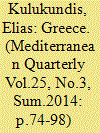

|
|
|
|
|
| Summary/Abstract |
Inconvenient truths about Greece’s current economic predicament are not often heard in today’s Greece, especially if they conflict with the picture presented by the Greek government. When they are heard, they are usually put down to adverse propaganda or positions of vested interests from abroad. This lack of meaningful dialogue is the product of an environment of disrespect for objective reporting, a surrender to cultural stereotyping, and a sense of hopelessness among the population, all of which are made more destructive by the overwhelming burden of debt. The roots of Greece’s current ills lie also in the political abuses of its past, for which many of the present leaders have a share of responsibility. This essay presents a detailed picture of today’s Greece with special emphasis on sociopolitical issues that are likely to lead to one of three possible outcomes. A clear consideration of these can enable Greece to choose its destiny—instead of having it being thrust upon the country—and in the process succeed in achieving real reform.
|
|
|
|
|
|
|
|
|
|
|
|
|
|
|
|
| 10 |
ID:
134749


|
|
|
|
|
| Summary/Abstract |
This article reviews the impact and effectiveness in implementation of the Mahatma Gandhi National Rural Employment Guarantee Act (MGNREGA) at state level as well as at village level with focus on inclusiveness, rural labor markets and agriculture. The paper finds that some states are more effective in implementation then others. The states which effectively integrated MGNREGA works with local planning gained much in terms of employment generation and asset creation leading to increased agricultural potential. The scheme is more inclusive of vulnerable sections of the society including scheduled castes and tribes and also women. Study also highlight the village level differences in implementation and effective implementation leads to reduction of hunger and poverty. More importantly the scheme increased bargaining power of rural laborer in agricultural sector, resulted in higher wage rates, better work environment and less exploitation.
|
|
|
|
|
|
|
|
|
|
|
|
|
|
|
|
| 11 |
ID:
134865


|
|
|
|
|
| Summary/Abstract |
This paper examines the impact of China's 2007 Administrative Measures on Information Disclosure by Listed Companies (“AMID”) on the information environment for Chinese listed companies. AMID requires continuous disclosure of price sensitive information and prohibits the selective disclosure of private information.
We find evidence that the number of non-periodic price sensitive announcements by Chinese listed companies on the A-share market significantly increased post the 2007 AMID reforms. A greater level of information disclosure should improve market fairness for all investors and reduce any information asymmetry between informed and uninformed investors in the Chinese A-share market.
|
|
|
|
|
|
|
|
|
|
|
|
|
|
|
|
| 12 |
ID:
135217
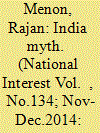

|
|
|
|
|
| Summary/Abstract |
OVER THE last two decades, numerous books, articles and press commentaries have hailed India as the next global power. This flush of enthusiasm results partly from the marked acceleration in India’s economic growth rate following reforms initiated in 1991. India’s gross domestic product (GDP) grew at 6 percent per year for most of the 1990s, 5.5 percent from 1998 to 2002, and soared to nearly 9 percent from 2003 to 2007, before settling at an average of 6.5 percent until 2012.
|
|
|
|
|
|
|
|
|
|
|
|
|
|
|
|
| 13 |
ID:
135154


|
|
|
|
|
| Summary/Abstract |
Despite long historical ties, post-colonial relations between India and Myanmar have fluctuated between magnanimity and mistrust. While India often stood for high moral grounds and promotion of democracy, it did so at the cost of losing Myanmar to China. This affected both India and Myanmar adversely: while New Delhi’s economic, energy and security interests were hurt, isolated Yangon became more China-dependent. However, since the early 1990s, domestic developments in Myanmar and post-Cold War structural changes in the world order necessitated conditions for cooperation and mutual gains. It appears that blatant domestic suppression in, and international seclusion of, Myanmar is not desirable. Having witnessed two eras of magnanimity and mistrust, Prime Minister Manmohan Singh’s visit to Myanmar in 2012 heralds a prospective era of market interdependence while opening Pandora’s box: can India get a better share of Myanmar’s commercial possibilities without compromising its core interests in promoting democracy, development and diaspora protection?
|
|
|
|
|
|
|
|
|
|
|
|
|
|
|
|
| 14 |
ID:
135104
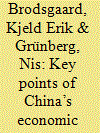

|
|
|
|
|
| Summary/Abstract |
At the Third Plenum held in November 2013, the Communist Party of China (CPC) adopted a comprehensive reform programme containing no less than 300 reform proposals. It is potentially the most important reform document to have been passed by the CPC since the landmark Third Plenum in December 1978. Entitled ‘The Decision of the CPC Central Committee on Some Important Questions Concerning Comprehensively Deepening Reform’, the programme upgrades the role of the market in the general economic system from ‘basic’ to ‘decisive’. It also stipulates a number of reform measures within finance, banking, tax, real estate, hukou, urbanisation, government administration, family planning, etc., and establishes two new important leading bodies. One is The Central Leading Group on Comprehensively Deepening Reform and the other is the National Security Council. Xi Jinping is named chairman of both of these new powerful institutions. This indicates his increasingly dominant role in Chinese politics. The reform programme aims to create a more open and market-regulated Chinese economy by 2020, although without dismantling the guiding role of the state-owned economy. The article argues that implementation of the new ambitious goals will be met by resistance from entrenched vested interests. In the state-owned enterprise (SOE) sector powerful actors and interests will try to preserve the status quo. Some private investment will be allowed in publicly-owned entities in order to create enterprises characterised by mixed ownership. However, in key sectors of the economy SOEs will still enjoy a monopoly and will not be exposed to free market competition.
Banks and Finance
|
|
|
|
|
|
|
|
|
|
|
|
|
|
|
|
| 15 |
ID:
136929


|
|
|
|
|
| Summary/Abstract |
Russia was among many countries hit by protest mobilisations in the aftermath of the Great Recession. Changes in the patterns of political mobilisation seemed to go hand-in-hand with attitude change and shifts in the social structure, such as the emergence of a mass urban middle class. These developments stimulated a lively academic debate on the relationships between the patterns of protest, the nature of the political regime, attitude change and social modernisation. Economic success does not preclude the expansion of protest activity; for example, in China since 1994 the annual number of protest events has grown even faster than per capita Gross Domestic Product and in 25 years increased by a factor of 20.1 Mature liberal democracies also seem to be conducive to protest mobilisations, which allowed Meyer et al. (1998) to define them as ‘movement’ societies. In a recent study of 283 mobilisation episodes from 1900 to 2012, Beissinger and Putnam (2014) conclude that revolutions have become more frequent and have given rise to a new urban model centring on civic purposes rather than goals of social transformation. This model assumes a transition to different tactics (from rural-based rebellions to mass protests in urban spaces) and a different class composition of protesters (from peasants and workers to the urban middle class).
|
|
|
|
|
|
|
|
|
|
|
|
|
|
|
|
| 16 |
ID:
135289


|
|
|
|
|
| Summary/Abstract |
The European Union's (EU) trade and development ‘partnership’ with the African, Caribbean, and Pacific (ACP) countries has long interested scholars of North-South relations. Historically, the theoretical literature on ACP-EU ties has been characterised by liberal institutionalist accounts of interdependence and critical assessments of Europe's neo-colonialism. In the timeframe of the Cotonou Agreement (2000–20), this division has expressed itself in relation to liberal assessments of Europe's pursuit of pro-poor market reforms in the Post-Washington Consensus and critical accounts of Europe's neoliberal ‘development’ agenda. This article argues that a moral political economy offers an innovative lens for the latter critical assessment of ACP-EU ties. With a constructivist focus on Europe's normative ‘development’ agenda, a moral economy standpoint may draw attention to the EU's role in (re)embedding poverty through recourse to legitimating ethical discourse. This is seen to enable the critical school to more closely consider ideational/discursive power in response to contemporary liberal institutionalist accounts. The article focuses on the European Investment Bank (EIB) and its activities in ACP countries – with particular focus on the Bank's Investment Facility (IF) – as an exemplar of the disjuncture between norms and outcomes.
|
|
|
|
|
|
|
|
|
|
|
|
|
|
|
|
| 17 |
ID:
135146
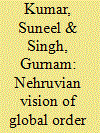

|
|
|
|
|
| Summary/Abstract |
Rejecting the various ‘World Order Models’ being projected as a panacea for a lasting peace, Nehru visualised ‘World Union’ based on democratic principles to create an egalitarian social and economic order across the globe and to eliminate the recurring phenomena of conflict and tension which produce wars at regular intervals. The perceived ‘World Government’ could provide a platform to manage and eliminate the modern forms of warfare: ethnic conflicts, proxy wars, militancy, terrorism, etc., while accommodating and redressing the grievances and resentments of specific people across as well as within the borders of national units. A global legislature can provide the community of nations a uniform, codified and effective international legal order. The Nehruvian model which sought to create an egalitarian, ‘planned’ and ‘socialised’ world economic order by eliminating imperialism and colonialism in all forms and manifestations could be relevant to manage the global economic crisis and also for the development of underdeveloped world. A World Union based on democracy and freedom may protect individual and group rights against ethnic cleansings and genocides and may help to universalise the institution of democracy. A strong world government, suggested by Nehru, can control nuclear proliferation and save mankind from the scourge of nuclear war.
|
|
|
|
|
|
|
|
|
|
|
|
|
|
|
|
| 18 |
ID:
134704


|
|
|
|
|
| Summary/Abstract |
This research explains the politics of financial reforms in Indonesia by applying the theory of veto players. By comparing the periods during and after the International Monetary Fund (IMF) programs, I analyze temporal variations in the effects of the IMF and the number of veto players on financial reforms in Indonesia.
|
|
|
|
|
|
|
|
|
|
|
|
|
|
|
|
| 19 |
ID:
134871


|
|
|
|
|
| Summary/Abstract |
Ma Jiantang has headed China's National Bureau of Statistics since September 2008. I review his career before arriving at the NBS, major reforms introduced in his first five years, shortcomings that remain in China's statistical system and alternatives to the official data that are springing up. Although Mr. Ma has accelerated the NBS reform agenda, significant weaknesses remain, calling into question everything from the true level of unemployment to the share of consumption and investment in gross domestic product, and opening a space for alternative providers to step in as sources of essential information on China's economy.
|
|
|
|
|
|
|
|
|
|
|
|
|
|
|
|
| 20 |
ID:
135429


|
|
|
|
|
| Summary/Abstract |
The practice of investigative journalism in China burgeoned in the early 1980s in the wake of the economic reforms, and it has been growing rapidly since the mid-1990s. Today, it is one of the most vibrant parts of Chinese media. As a thermometer for press freedom and a crucial site for examining the media‒state relationship in China, investigative journalism has attracted a substantial amount of scholarly
attention during the past three decades. This article critically reviews research, published both in mainland China and overseas, on the topic from 1978 to 2013. We first present a quantitative analysis outlining
certain basic characteristics of the field of investigative journalism research based on a sample of 112 mainland publications and 14 overseas publications. We then present a qualitative review of existing knowledge about investigative journalism in China. Finally, we highlight some of the newest developments in the phenomenon and discuss several directions for future research.
|
|
|
|
|
|
|
|
|
|
|
|
|
|
|
|
|
|
|
|
|